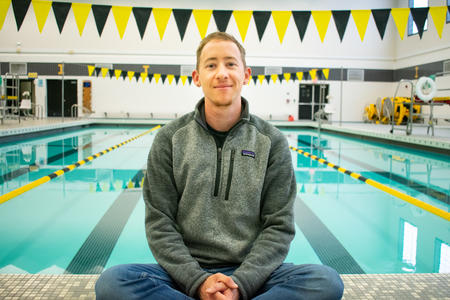An impressive chunk of his formidable collection — some 700 pieces and counting — is now housed at the Cheech Marin Center for Chicano Art & Culture (aka “The Cheech”), which opened in June 2022 in Riverside, California. It’s considered one of the largest such collections in the world.
Marin visited the Pacific Northwest last weekend as the guest star of a sold-out event kicking off a new show at Tacoma Art Museum. Co-presented with local nonprofit Mi Centro, El Noroeste has a short run (through Oct. 1) but a big impact.
Featuring work by contemporary local Chicano and Latino artists including painter Jake Prendez, muralist Angelina Villalobos, block-relief printer Christie Tirado and glass artist Manolo Aguilera, the show reflects both a sociopolitical viewpoint and the vast diversity of perspectives within that cultural slice.
“You can’t love or hate Chicano art unless you see it,” Marin likes to say — a prompt to get people out to experience this important work, perhaps especially now, during Hispanic Heritage Month (celebrated Sept. 15 - Oct. 15).
MadArt Studio in South Lake Union offers the chance to see Latino art in process with the new exhibit Future Cosmologies: The Regeneration of Maya Mythology. (Watch the work come together via open studio viewings through Oct. 18, then see the completed exhibit Oct. 19 - Nov. 22.)
Created by Tacoma-based multimedia artist Priscilla Dobler Dzul with curatorial assistance by Adetola Abatan, the installation uses painted and unglazed ceramics, live plants, embroidered textiles, an immersive “rain ritual” and audio components to tell stories both ancient and deeply personal.
With ancestral roots in Yucatán, Mexico, and Glasgow, Scotland, Dobler Dzul always layers various histories into her work, at times incorporating weaving traditions from both lines of her heritage. For this show she’s inventing ceramic creatures — including a two-headed crocodile and a 250-pound “La Madre Jaguar,” which sports both spots and human breasts — that reference contemporary queer culture as well as mythological narratives.
“I like using mythological stories that are based around Mayan folklore,” she says in a video interview for the Neddy Award, which she won in 2022. “But also using Greek and Egyptian [myths] ... then also creating my own into a contemporary aspect of what identity is right now.”
In addition to the past and present, Dobler Dzul incorporates visions of the future into this show, such as three futuristic woven pods that might just beam viewers across all parts of the timeline at once.
The Washington Center for the Book announced the winners of the Washington State Book Awards this week, including: Sasha taqʷšəblu LaPointe for her memoir Red Paint: The Ancestral Autobiography of a Coast Salish Punk; Kim Fu for her short-story collection Lesser-Known Monsters of the 21st Century; and J. Kenji López-Alt for his cookbook The Wok: Recipes and Techniques.
And this year’s winner of the poetry book category is We Had Our Reasons: Poems by Ricardo Ruiz and Other Hard-Working Mexicans from Eastern Washington. For this unusual and compelling collaboration, Ricardo Ruiz interviewed Mexican American friends and family in Eastern Washington about their personal histories — then turned those stories into poems, printed in both English and Spanish.
Ruiz’s own story started in Moses Lake, where he was born. (His parents had emigrated from Mexico to Washington and received permanent residency status before he came along.) He grew up in Othello, where his parents worked in a potato factory.
After a military career that included two tours in Afghanistan, Ruiz earned a BA in poetry from the University of Washington. It was there, with the assistance of English professor and Hugo House co-founder Frances McCue, that he was inspired to start collecting rural Mexican immigrant stories and transforming them into poetry.
He had originally planned to focus on immigrants of his parents’ generation, but quickly realized an “intergenerational narrative needed to be told.” The result is an evocative mix of “documentary poetry” that’s both factual and metaphorical, plainspoken and lyrical — a book that offers a deeper understanding of a Northwest population that for decades has been disregarded and overlooked.
There’s a whole lotta theater on stage right now — and plenty of urgent reasons to get out and support live performance. Among the current options:
Two Big Black Bags, at West of Lenin in Fremont (through Oct. 14): Presented by eSe Teatro and written by Northwest-based Argentinian playwright Julieta Vitullo (who also has a very cool typewriter-poetry project, Poemas Eternos), the story concerns an Argentine veteran of the 1982 Malvinas/Falklands War who wakes up one day to discover two black bags stuffed with millions of dollars. As he journeys from Seattle to South America, realities of war and trauma mix with moments of magical realism.
Cambodian Rock Band at ACT Theatre (Sept. 29 - Nov. 5): Co-produced by The 5th Avenue Theatre, Lauren Yee’s award-winning play with live music is getting a lot of buzz for its unusual blend of intergenerational trauma and surf rock. Taking place on two timelines — a musician in 1978 struggling under the Khmer Rouge and in 2008 during his return trip to his Cambodian homeland — the play relies on dark humor and songs from real-life rock band Dengue Fever to keep the story rolling.
[siccer] at On the Boards (Sept. 28 - 30): New York-based choreographer Will Rawls uses this multimedia performance piece to explore the ways in which Black bodies are documented and distorted in the media. Combining a Kermit-green palette, a stop-motion camera, video projections, a sense of humor and the movement of five dancers, Rawls plays off the Latin [sic] notation, used to point out that a source quoted has made a grammatical error. But in Rawls’ usage, rather than a monitor for what’s considered “correct,” [sic] becomes a portal for transmitting secret messages, truths unseen by those who don’t look closely enough.
Get the latest in local arts and culture
This weekly newsletter brings arts news and cultural events straight to your inbox.






